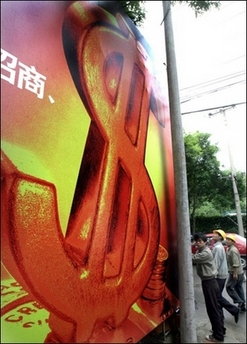BEIJING - With forex reserves rising dangerously close to the awesome
one-trillion-dollar mark, China has issued an unusually high-level warning that
they should not be permitted to grow much further.
|

A worker puts up a new billboard with a big
dollar sign in Beijing, May 2006. With forex reserves rising dangerously
close to the awesome one-trillion-dollar mark, China has issued an
unusually high-level warning that they should not be permitted to grow
much further. [AFP]
|
The forex reserves,
already the biggest in the world, hit 954.5 billion dollars at the end of July,
up by nearly a third from one year earlier, state media said Tuesday.
"We will take comprehensive measures to avoid further significant growth in
the foreign exchange reserves," Vice President Zeng Qinghong said in an article
published on the website of the official publication Study Times.
"The foreign exchange reserves have reflected China's growing economic power
but on the other hand they have increased exchange rate risks and added upward
pressure on the yuan," he said.
The latest figure translates into 30.3 percent growth from US$732.7 billion
at the end of July 2005 and places China well on track to hold an unprecedented
one trillion dollars in forex reserves by the end of the year.
"From the statement by Zeng Qinghong, we can seee it is a relatively urgent
issue," said Shi Jianhuai from the China Center for Economic Research,
a state think tank.
The speedy growth in China's forex reserves is one of the most visible
symptoms of China's growing power as an exporting nation.
China's trade surplus soared over 40 percent year-on-year to 14.6 billion
dollars in July, bringing the seven-month figure to 76 billion dollars, up
nearly 52 percent from the same period in 2005.
Since China revalued its currency by 2.1 percent in July 2005, ending the
currency's decade-long peg to the dollar, but since then the yuan has risen only
at a snails pace, sparking fresh demands for more rapid change.
China says that it allow more flexibility in its forex management regime
but also notes that it must move at its own pace rather than risk a major shock
to its financial system.
However, some observers believe China could be forced into further change
sooner rather than later as the massive fund inflows accompanying the trade
surplus pose enormous policy challenges under a rigid exchange rate regime.
To keep a stable exchange rate, Beijing has to constantly buy up the dollars
coming into the sytem with yuan which in turn boosts liquidity in the local
financial markets.
That liquidity in turn has to be soaked up via the sale of government debt
instruments to avoid inflationary pressures but the question is how long this
can continue.
"The rate of increase in forex reserves is relatively fast," said Qu
Hongbing, chief China economist with HSBC based in Hong Kong.
"I believe the central government will undertake measures to slow down the
speed."